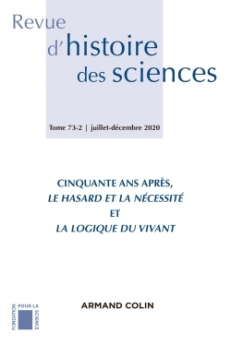
Revue d'histoire des sciences (2/2020)
Pour acheter ce numéro, contactez-nous
Recevez les numéros de l'année en cours et accédez à l'intégralité des articles en ligne.
Le livre Le Hasard et la nécessité est incontestablement un livre à thèses, et celles-ci n’y sont pas énoncées timidement. L’une d’elles est l’affirmation que le vivant moléculaire procède du jeu de la nécessité, du hasard et de la finalité. Le titre du livre de Monod est devenu si célèbre qu’il masque désormais à quel point cette place faite au hasard et surtout à la finalité n’avait rien d’évident lorsqu’on envisage la manière dont le problème de l’adaptation enzymatique était posé au début des années cinquante à l’Institut Pasteur. L’objet de cet article est de montrer comment et pourquoi Jacques Monod a opéré un revirement complet dans sa conception des rapports entre nécessité, hasard et finalité au cours de sa carrière. Ce renversement s’est accompagné de la montée en puissance et de la transformation d’un concept particulier, propre à Monod, celui de gratuité. Introduit au début des années cinquante comme qualifiant certaines conditions expérimentales, il devint progressivement un authentique attribut du vivant. Il s’agira ici de révéler les changements d’attitude de Monod au prisme de l’histoire du concept de gratuité, une histoire profondément enracinée dans le travail expérimental quotidien du groupe pasteurien.
Chance and necessity is unquestionably a book of theses, and these are not timidly stated. One of them is the assertion that molecular life proceeds from necessity, chance and finality. The title of Monod’s book has become so famous that it now masks the extent to which this emphasis on chance and, above all, on finality was not obvious when one considers the way in which the issue of enzymatic adaptation was framed at the Pasteur Institute in the early 1950s. The purpose of this article is to show how and why Jacques Monod operated a complete reversal in his conception of the relationship between necessity, chance and finality during his career. This reversal was accompanied by the rise and transformation of a specific concept, peculiar to Monod, that of gratuity. Introduced at the beginning of the 1950s to qualify certain experimental conditions, it gradually became an authentic attribute of living beings. In the present article, I highlight the changes in Monod’s attitude from the perspective of the history of the concept of gratuity, a history deeply rooted in the daily experimental work of the group at the Pasteur Institute.